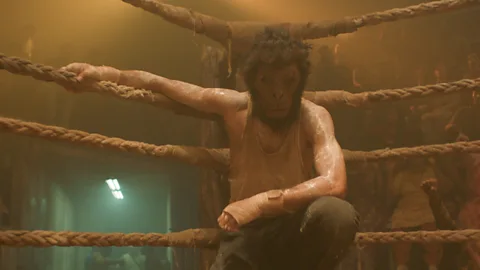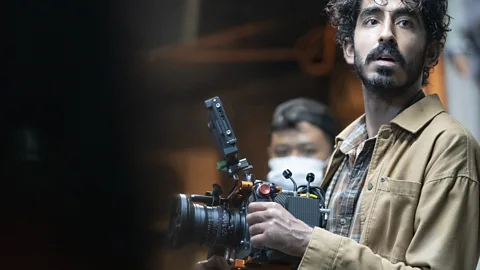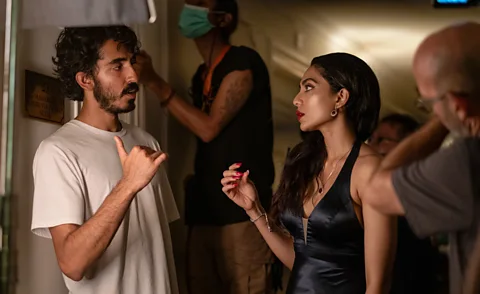Monkey Man: Dev Patel tackles Indian corruption in violent action-thriller
 Universal Pictures
Universal PicturesDev Patel and Jordan Peele reveal how Hindu mythology, martial arts films and India's harsh social issues inspired their exciting new action-thriller.
Oscar-nominated for his performance in Garth Davis's 2017 film Lion, Patel first achieved global recognition in 2008 when he played a love-struck teenager in Danny Boyle's hit crowd-pleaser Slumdog Millionaire. But for his own first film, Monkey Man, which he also co-wrote, Patel transforms himself into a taut action-hero, Kid, bent on revenge for an atrocity carried out by a powerful religious and political figure against his childhood village in India. He's also joined by a mainly Indian cast.
The film, he says, is inspired partly by his own love of action movies, favourites including Bruce Lee martial arts films, Korean revenge cinema and the 2011 Indonesian film by Welsh director Gareth Evans, The Raid: Redemption. (One viewer described Monkey Man to Deadline as "John Wick in Mumbai".) But the film is also fused with glimmers of harsh social realities in modern India as well as Hindu mythology. It is inspired by the legend of divine monkey Hanuman, an icon who symbolises strength and courage, and who also warns against the abuses of unbridled power.
Patel says he hopes that even though this is only his directorial debut, he might be bringing something new to the action genre, which he tells the BBC, "can sometimes be misused".
"Just speaking as a consumer, as someone that is just a humble fan, I think sometimes it can be misused as a medium to churn out mindless, senseless violence that after a while can just wash over you, so you don't really feel the collateral," he says. "What I wanted to do here was to give it some real grounding, some real context.
"My initial pitch to the financiers was that I want to create a revenge film about faith and how powerful faith is, how it can be manipulated, weaponised, how it can be a beautiful teacher, particularly to Kid, who's grown up in this forest with no education. I wanted to create a story about the underdogs challenging the untouchable status quo, and the action genre already delivers this inherent caste system of a hero working his way up to reach various bosses. I thought, 'wow, we could really implement that with this film in a really interesting way'."
 Universal Pictures
Universal PicturesMonkey Man was originally sold to Netflix, but was then championed by Jordan Peele, the Oscar-winning director of horror hit Get Out (also an actor himself) who picked it up for his own production company. "It's one of these kinds of rare films where an actor directs a project with themselves in it, and you can just imagine how all consuming, how difficult this must have been," Peele tells the BBC. "You see movies like Dances with Wolves and Braveheart and you're thinking, 'how do you do that?' That's what this was. It reminded me of a type of movie that people don't dare to make anymore."
'A cocktail of identity'
Patel recalls that his love of movies stems from a childhood in London, when he'd try to stay up late to watch Bruce Lee or Shah Rukh Khan Bollywood action movies, before also discovering Korean cinema. The stories of Hanuman were first told to him by his grandfather. From a young age, he says he wanted to make something that injected his own culture into the action genre. "I've just always wanted to be represented, my culture and my ancestry. I wanted to put a different spin on things, so to speak," he says.
After Slumdog Millionaire, Patel was seen in a variety of roles, from the earnest but inept hotel manager of The Best Exotic Marigold Hotel (2011) to the geeky robotics engineer in 2015's Chappie (whose leading actor, Sharlto Copley, appears in Monkey Man as a sleazy boxing ring owner). After his Oscar success with Lion, where he played an Indian adopted by Australian parents trying to find his roots, Patel took on some iconic British characters, including the titular role in Armando Iannucci's The Personal History of David Copperfield (2019) and Sir Gawain in David Lowery's The Green Knight (2021).
But he's spoken about his past frustrations at feeling "pigeon-holed" as an actor and has described Monkey Man as "an anthem for the underdogs, the guy who tries and fails, who tries again, only to fail once more". The character of Kid is first introduced to audiences being beaten up wearing a monkey mask in a boxing ring, and his transformation into a suit-wearing avenger comes much later in the film.
 Universal Pictures
Universal PicturesDoes he feel like an underdog himself?
"I think we're all the underdogs of our own story," he says. "I think everyone feels like that. Even if they don't feel like that now, I'm sure that even with the greats, if you asked Roger Federer in his prime, he would still feel like an underdog and that's why he came back and played again and again. I think it's a truly universal feeling. The themes we're touching upon are truly global: police corruption, brutality, violence against women. There's so many in my story. It just so happens that these underdogs band together."
"I myself have always felt that I'm battling the odds and trying to forge new ground," Jordan Peele adds. "And I've felt like such an underdog in the concept of directing myself that I haven't even attempted it. So, I think that he's certainly an underdog. But I do find that actors who've worked with the calibre of directors that Dev has, just actually have an unbelievable amount of experience in film and really can come into directing, having had a front seat in these most important relationships in a film."
Although the film is set in a fictional Indian city, Patel highlights real social details. Cars pass children and whole families sleeping on the streets, Kid goes to sleep with scores of other workers in one room, some women characters are trafficked, another raped and killed. There's political and religious unrest and corruption. Patel also gives a pivotal role to a gender non-conforming and transgender community (hijra), who in the film are shunned by some in society, and especially by the police.
"I guess the film's a sort of Trojan horse," he says. "Having spent most of my career travelling in and out of India shooting films, it is hard to ignore some of the stories that fill the columns of the newspapers there. I wanted to touch on some of that and maybe reach an audience that would never normally access such topics. But at the same time, it's not just an Indian issue. Violence against women, police brutality, identity, those things are truly global things. This was just a great package for me to be able to talk about certain things."
More like this:
Reaction to Monkey Man after its world premiere at the SXSW Film Festival has been positive, with the word "audacious" frequently used to describe it. The filmmaker has spent at least six years working on the project from its announcement. Once financed, it was nearly cancelled because of Covid-19 in March 2020. Filming moved from India to a small Indonesian island; then the actor-director broke his hand in one of the first action sequences and had to receive medical treatment in Jakarta.
"At one point I'm thinking, 'am I holding on for dear life or am I the one who's my own worst enemy in this scenario?'" he says. "You're trying to hold so much choreography in your head with all the stunt moves and the production design, and you always have a really intense plan that has to be thrown out on a daily basis, particularly as we were shooting during Covid. It was really a process of being nimble and adapting and pivoting all the time. As an actor, you have to be very open and instinctive. I don't think I'm a particularly technical performer. I relied on those instincts when I was making the film.
"I wouldn't shy away from giving the odd poor man's Braveheart speech to the crew to get them riled up for the day."
If Monkey Man comes across as a blend of influences, Dev Patel says he's happy that it reflects his own upbringing. "I've found myself not really being represented on screen for what I am, which is the product of two different worlds. I grew up in the UK, listening to rap and grime tracks as well as Bollywood music. So, a cocktail of identity is truly for me what 2024 should look like, and also 2025 and 2026 and beyond. That's what representation needs to look like for me, and that's this film."
Monkey Man is released in the UK and the US from 5 April.
--
If you liked this story, sign up for The Essential List newsletter – a handpicked selection of features, videos and can't-miss news delivered to your inbox every Friday.
